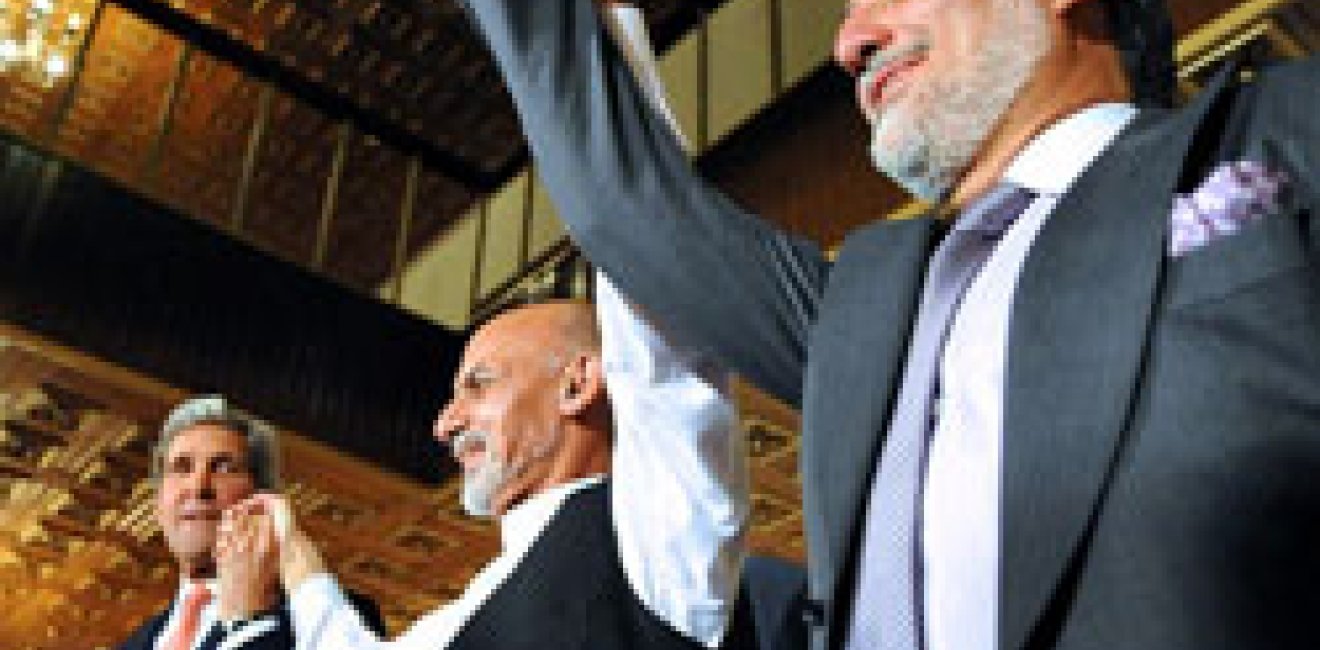Five months after Afghans voted in national elections, they finally have a new government—albeit not the kind they had in mind. In effect, two bitter rivals in a bitterly divided nation will be sharing power under an arrangement that represents not the will of the Afghan people but a solution imposed by the international community.
The two top presidential candidates, Ashraf Ghani and Abdullah Abdullah, have pledged to form a national unity government in which Mr. Ghani, the election winner, will be president and Mr. Abdullah, the runner-up, will appoint a chief executive officer (though he may decline this post himself and opt for another position).
Many observers believe that the unity government–which has roots in an accord Secretary of State John Kerry brokered this summer after Mr. Abdullah alleged massive fraud in the election and withdrew from the process– won’t last long. One Afghan lawmaker has described it as a “painkiller drug“—a short-term curative that will wear off quickly.
Here are four questions to consider in the coming weeks. The answers are likely to reveal much about the success and duration of Afghanistan’s new government.
1. How will Afghans respond?
Afghans braved Taliban threats to vote for a new president, not for an externally imposed solution that forces their preferred candidate to share power. While many are relieved that the crisis is over and simply want to move on, there is a real prospect of sore losers staging civic unrest.
2. Can Mr. Abdullah control his more hard-line supporters?
In recent weeks, some Abdullah supporters have threatened violence; this summer some reportedly planned to seize several government facilities. Ominously, Abdullah campaign officials have admitted that an unfavorable outcome—including a power-sharing arrangement perceived as too generous to Mr. Ghani—might trigger violence that they wouldn’t be able to control. At an event this month commemorating the late freedom fighter Ahmad Shah Massoud, Mr. Abdullah himself was unable to calm supporters after they loudly booed a pro-Ghani speaker.
3. Will Mr. Ghani truly share power?
The unity government’s legitimacy derives solely from the agreement these candidates signed—not from Afghanistan’s constitution or the Afghan people. There is no legal framework to fall back on. This means that Mr. Ghani could well interpret conditions to his advantage. If the two rivals—or their polarizing supporters who join the government—begin to spar, then Mr. Ghani could seek to expand his powers by exploiting the agreement’s stipulation that the CEO must answer to him.
4. What will the Taliban do?
Mr. Ghani has expressed interest in pursuing peace talks with the Taliban, but Mr. Abdullah—formerly a top official with the anti-Taliban Northern Alliance movement—is more wary. The Taliban may seek to drive a wedge between the two by insisting on negotiating with Mr. Ghani and refusing to negotiate with Mr. Abdullah. It’s also possible that with foreign troops preparing to exit, the Taliban could intensify its efforts on the battlefield—and cause a rift between Mr. Ghani and Mr. Abdullah about whether talks are worth pursuing.
In a country as divided as Afghanistan, a rift of any kind could doom a unity government to a life that is—as Thomas Hobbes might put it—nasty, brutish, and short. Here’s hoping that Afghanistan’s new leadership avoids such a fate.
The opinions expressed here are solely those of the author.
The original article was published in The Wall Street Journal's Washington Wire.






